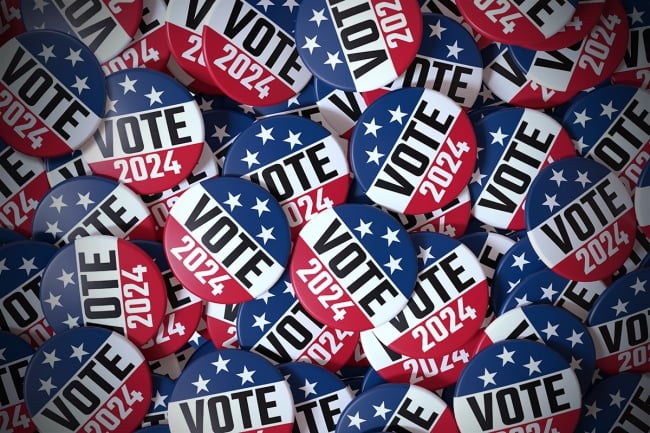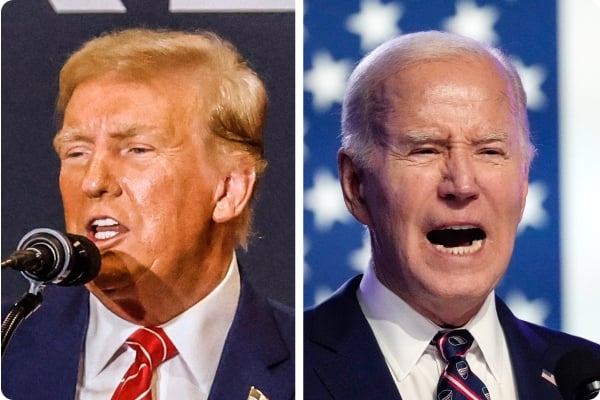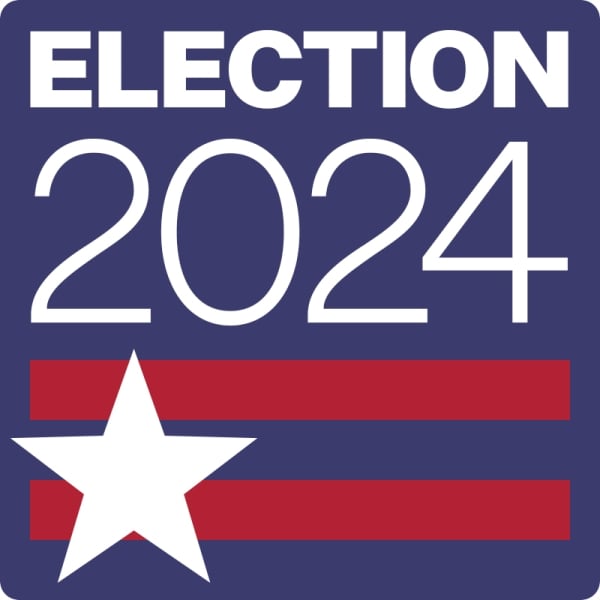You have /5 articles left.
Sign up for a free account or log in.

Past elections have led to a host of new rules for colleges and universities.
Getty Images
The fight for control of the White House and Congress in 2024 has already seen calls from candidates to fire “radical left” accreditors, end the tax-exempt status of elite universities and defund some colleges. It’s one sign among many that higher education policy, typically a back-burner issue in federal campaigns, could play an unusual role in this year’s elections.
Higher education has found itself increasingly in the headlines—and the political crosshairs—in recent years, as public confidence in the value of colleges and universities has plummeted. While younger progressives have agitated for student loan cancellation and boycotting Israel, Florida’s Republican governor, presidential hopeful Ron DeSantis, who finished second in Monday's Iowa presidential caucuses, has sought to significantly reform colleges and universities in his state to end the “woke activism” that plagues it in the view of the right.
Last year’s controversies over President Biden’s attempts to cancel student debt, the Supreme Court’s conservative majority striking down that effort along with race-conscious admissions policies, and the tumult on campuses over the Israel-Hamas war have only turned up the heat on colleges and universities. Seeing an opening to make more sweeping changes to higher education, Republicans have recently latched on to the issue of campus antisemitism as a way to address their other concerns about the system, which they argue is out of touch and not meeting the needs of everyday Americans.
Higher education hasn’t historically been a key talking point, much less a major policy plank, in presidential or congressional campaigns. But former president Donald Trump, who won a commanding victory in the Iowa caucuses Monday, and other Republicans have been talking about it more—denouncing Biden’s student debt relief policies; diversity, equity and inclusion programs at colleges and universities; and other issues as part of a broader attack on higher education.
“We spend more money on higher education than any other country and yet, they’re turning our students into communists and terrorists and sympathizers of many, many different dimensions,” Trump said in November when announcing his plan to create a free online national university. “We can’t let this happen.”
The increased chatter about higher education from Trump, who focused little on the issue in his first term, reflects increasing interest from top politicians and policymakers—Republicans in particular. That interest may mean that there is finally the political will to make changes that some conservatives have wanted to see for years—especially if Republicans take control of the White House and both chambers of Congress in November.
“Postsecondary education is in a tailspin,” said North Carolina representative Virginia Foxx, the powerful Republican chair of the House education committee, in a recent statement. “There has been a hostile takeover of postsecondary education by political activists, woke faculty, and partisan administrators. College campuses are a breeding ground for illiberal thought.”

Former president Donald Trump has threatened to fire what he calls “radical left” accreditors and proposed a plan for free, online national universities. Meanwhile, President Biden has focused on improving the financial aid system while in office and forgiving billions in loans.
Tannen MauryAFP/Getty Images; Drew Angerer/Getty Images
While higher education policy won’t make any top 10 lists of voters’ major concerns, the election will have enormous consequences for colleges and universities, determining what federal rules they are subject to, how they access federal financial aid and how they respond to reports of sexual harassment or assault. Past elections have meant the undoing or rewriting of significant federal regulations that dictate how colleges should be run. A second Biden administration could cement many of the president’s policies, including efforts to improve the student loan system and provide relief to millions of borrowers.
Neither political party is interested in a hands-off approach to higher education, though they have different theories about the underlying problems plaguing colleges and universities. Holding institutions of all types accountable and making college more accessible and affordable will likely top any agenda for the next four years. But the two parties have markedly different solutions to offer.
“The upcoming election just has enormous stakes for whether there will or will not be accountability for higher education,” said Michael Brickman, a senior fellow at the American Enterprise Institute, a conservative think tank. “The fact that so many students go to these institutions [and] are promised a really good education in exchange for their or the taxpayer’s dollar, and then end up, for one reason or another, graduating and unable to pay off their loans … there’s really just no accountability on the institutions.”
Brickman, who worked in the Education Department during the Trump administration and has been critical of Biden’s debt-relief policies, would like to see institutions on the hook for unpaid student loans—a policy stance Democrats have historically balked at but one that House Republicans have proposed in their latest plan to overhaul the federal student loan system.
Brickman said a Republican victory could ensure that student loans are paid back by the people who borrowed the money. But he worries that taxpayers will foot the bill for debt relief under Biden’s plans if Democrats win.
He expects education to play a role in this election whether it’s because of “the social issues that have been generating a lot of attention lately, or the kitchen-table issues” such as college affordability.
“From a student’s perspective, we want to make sure that they are enrolling in an institution that’s going to help them in later life,” he said. “From the taxpayers’ perspective, even if they themselves or their family members are not enrolled in higher education, they’re now increasingly being asked to pay for higher education for others. And so I think there’s more and more at stake. There’s more and more of a cost. Because of the increasing divisiveness of what’s happening on campus, it’s drawing more and more attention to these issues.”
Biden Debt Relief Policies at Stake

Higher education could play more of a role in the 2024 election than in recent ones, experts predict.
Justin Morrison/Inside Higher Ed
The Biden Education Department has spent much of the last three years restoring rules that were put in place by the Obama administration and walked back during the Trump administration. Biden has rolled out new ways to protect students from bad actors, to show which colleges leave students with unaffordable debt and to hold career education programs accountable by threatening their access to federal student aid.
But overhauling the student loan system and providing broad-based student loan forgiveness have been the president’s chief higher education priorities. So far, the administration has forgiven nearly $132 billion for 3.6 million borrowers, and plans are underway to provide more relief.
“From Day One of my administration, I vowed to fix the student loan system and make sure higher education is a pathway to the middle class—not a barrier to opportunity,” Biden said in a recent statement. “I won’t back down from using every tool at our disposal to get student loan borrowers the relief they need to reach their dreams.”
The 2024 election will determine whether the president’s accountability rules and efforts to fix the student loan system stand—at least for a while. Another four years could give those changes time to take root in the higher education system, which could make it more difficult for a future administration to roll them back. If Republicans take control of Congress and Biden prevails, they could try to block some of the administration’s regulations. However, those efforts would still be subject to the president’s veto power. Divided government would also mean greater congressional oversight of the Education Department, as seen in the last year.
The changes to the student loan system, and the loan forgiveness measures in particular, have sparked fierce pushback from congressional Republicans who have argued that Biden is exceeding his authority. A legal challenge to the president’s bid to forgive up to $20,000 in loans for eligible Americans ended at the Supreme Court, which struck down the plan in June.

Biden has continued to tout his push for debt relief as he seeks a second term and courts younger voters, though a recent Bloomberg poll found that Generation Z voters in swing states think the president is doing too little to address the student loan debt crisis. Vice President Kamala Harris embarked on a speaking tour of college campuses this past fall, signaling that the Biden campaign sees wooing college-aged voters as key to his re-election bid.
Trump has called Biden’s broad debt relief “very unfair,” joining Republicans who argue that debt relief amounts to a wealth transfer, asks people who didn’t go to college to foot the bill for those who did and adds to the national debt. Public opinion on debt relief is generally split along party lines, according to polling from last spring,
Michelle Dimino, director of the education program at Third Way, a left-of-center think tank, said the new loan regulations would be vulnerable if a Republican administration takes over.
“That’s scary to think about borrowers having to undergo so much back-and-forth in terms of their payment plans, what’s expected of them and what options are available to them in such a short period of time,” she said. “If challenges to that plan are unsuccessful, and there’s a second Biden administration, you can expect that they’re going to be on a bit surer footing after eight years of a Biden administration.”
‘Regulatory Whiplash’
Extreme policy swings between Republican and Democratic administrations are a relatively new phenomenon in higher education, but perhaps not a surprising one, since voters are increasingly split along educational lines. College-educated Americans are more likely to back Democrats, while those who only have a high school degree tend to support Republicans.
At the same time, overall confidence in higher education has eroded over the past decade, reaching historic lows in a 2023 Gallup poll that found only 36 percent of Americans had either “a great deal” or “quite a lot” of confidence in higher education. The polling showed a sharp partisan split: about 19 percent of Republicans surveyed said they had confidence in higher education, while 59 percent of Democrats answered that way. The Gallup results mirror other public polling on how higher education is perceived.
Gallup didn’t explore why confidence was dropping, but in previous polls, Democratic respondents have cited concerns about the cost of college while Republicans say that colleges are hostile to conservative views and don’t allow students to think for themselves.
This partisan gap carries serious policy consequences. If Republican voters don’t trust or value higher education, then candidates seeking their support have less incentive to support colleges and universities. Attacking colleges and universities, as Trump and his Republican primary opponents have done, has become another culture war issue that can rally voters on the right.
“There’s a greater sense that higher ed is vulnerable, and going after higher ed can have political benefits,” said Jon Fansmith, senior vice president of government relations and national engagement at the American Council on Education, on a recent podcast episode. “And so given that, given the electoral cycle we’re entering into, the intensity of it and the importance of it, I don’t see that slowing down.”
The drop in confidence and split among voters make higher education more vulnerable, no matter which party wins. It’s not just Republicans who are looking to get more involved in regulating colleges and universities.
“I’m not sure right now there is a kind of small government party as it relates to regulating higher education,” said Craig Lindwarm, vice president of governmental affairs at the Association of Public and Land-grant Universities. “They just have very different opinions on how to do it.”
The growing polarization has led to what Lindwarm refers to as “regulatory whiplash” for institutions. When new administrations undo the previous president’s agenda, it is “incredibly expensive, burdensome and challenging” for colleges and universities, he said.
“A lot of institutions feel like they’re stuck in the middle and the ones having to ultimately manage the significant differences in policy between red administrations and blue administrations,” Lindwarm said. “It means excessive time spent and resources spent on deciphering new regulations and adopting policies to ensure compliance.”
Colleges and universities have seen this whiplash in a number of areas, including in how they are expected to respond to reports of sexual harassment.
In 2011, the Obama administration told colleges they were required under Title IX of the Education Amendments of 1972, the gender-equity law, to investigate all student reports of sexual misconduct. Colleges that failed to adequately respond to those reports faced civil rights investigations. Then the Trump administration came in, rescinded the 2011 guidance and proposed new regulations that created more stringent procedures for investigating cases of sexual harassment, in part to ensure due process for those accused of misconduct. Those rules took effect in August 2020—just months before Trump lost his bid for re-election.
“The Trump administration regulations on Title IX were incredibly prescriptive,” Lindwarm said. “In recent history, neither Republican or Democratic administrators have held back in furthering prescriptive regulations on Title IX.”
Overturning the Trump rules was a priority for the Biden administration, which proposed its own Title IX overhaul in June 2022 that sought to find a balance between the rights of assault survivors and the accused while rolling back the 2020 regulations. The final Biden rules are expected this spring and could take effect shortly before the election.
Gender-equity policy isn’t the only area in which colleges and universities have seen policies change significantly depending on which party controls the White House. The policy known as gainful employment has become a perennial political football since the Obama administration first proposed regulations on the topic in July 2010. In a nutshell, gainful-employment policies gauge whether career-training programs are adequately preparing graduates for the workforce and whether those graduates are making enough money to afford their student loan payments. For-profit and noncredit degree programs that fail the federal government’s tests could lose access to federal financial aid.
The Obama administration’s first attempt was struck down by the federal courts, but a second iteration—finalized in 2014—stuck. At least until the Trump administration took over. Former education secretary Betsy DeVos stopped enforcing the rule and then formally repealed it in 2019. The Biden administration started working on rewriting the gainful-employment rule in 2022 and issued its proposed regulations in May 2023.
“I do feel for career staff at the department who have been working on gainful employment and writing it, undoing it and writing it, over and over again,” said Brickman at AEI. “It’s got to feel like Groundhog Day for them.”
The Biden regulations will take effect in July, but Republicans have signaled that they want to rescind the policy if they win in November, preferring accountability measures that are applied equally across the board to those focused specifically on for-profits. But if either Republicans or Democrats take full control of Congress and win the White House, it could mean more dramatic changes that would carry the force of law.
Potential for More Sweeping Changes
Republicans in the House and Senate have outlined their wish list of sorts for higher education policy in a series of hearings and bills introduced over the past year. That list includes stronger oversight of foreign dollars flowing to colleges and universities, relaxing restrictions on for-profit colleges, limits on graduate student borrowing, and preventing all institutions from accessing federal financial aid if their graduates don’t meet certain earnings benchmarks.
“Democrats and Republicans agree that student loan debt in America has reached astronomical levels—the pursuits of students in postsecondary education have been undercut as a direct result,” Foxx said in a statement introducing her plan to overhaul the federal student loan system. “Without question, the root cause of this problem is the inflated cost of obtaining a college degree, and there’s considerable room for reforms.”
If Republicans take control of Congress and the White House, that could pave the way for some of the wish-list items to become law. Meanwhile, Democrats have unfinished business if they win unified power: they want to make community college free, boost consumer protections for students, increase the Pell Grant and codify federal regulations targeted at for-profit institutions, such as gainful employment.
Both parties want to rein in the cost of college, simplify student loan repayment and create some form of accountability for all colleges and universities that’s based on student outcomes such as completion rates. There’s also bipartisan interest in expanding the Pell Grant to include short-term workforce programs.
Still, neither party has been able to push through comprehensive higher education reforms when it controlled both the White House and Congress in the last 10 years—partly due the fact the issue hasn’t been a high political priority. The law governing higher education is long overdue for an update, but few expect Congress to reauthorize the Higher Education Act of 1965, a big and complex piece of legislation, in the foreseeable future. Congressional inaction has put pressure on the executive branch to make policy, which is easier to undo than legislation signed into law.
Chris Marsicano, an assistant professor of educational studies at Davidson College who studies the politics of education, said in an interview this fall that regardless of who wins in November, colleges and universities should expect more efforts to hold institutions accountable as well as continued scrutiny from lawmakers on either side of the aisle. If that’s the case, it could lessen some of the regulatory whiplash for institutions.
“In a world where we continue to have large national debt, states are trying to make ends meet and pay their pensions to a retiring baby boomer population, there is going to be a lot of concern about how money is spent,” he said. “Public institutions especially are going to have to demonstrate some sort of level of value moving forward, whereas they would have just been taken at their face value in the past. I don’t think that’s necessarily a bad thing or particularly partisan.”




